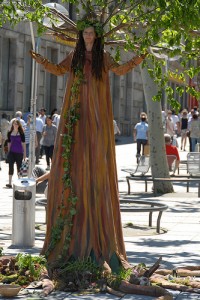by Heather Davis-Fisch
We live, now more than ever, in a performing society. Performances—both live and technologically mediated—are all around us.
Ask the average person how many theatre events they’ve attended lately and you will probably be met with a confused head tilt. But ask how many performances they’ve seen and chances are they’ll have dozens to discuss. Your chance to move from confused to well-versed happens next semester.

Photo Credit: Rob124 via Compfight cc
In Winter 2016, the English department is offering two courses that take a performance studies approach to literature and drama: English 234 (History of Drama and Theatre 1642-1914) and English 365 (History of Drama and Theatre 1914 to the Present). Students will analyze dramatic scripts and performance documents intertextually, considering theatre—and more broadly, performance—as not only collections of aesthetic and literary practices but also as public acts that perform vital cultural work.
If this sounds awfully ivory tower, remember that professionals in fields well outside the fine arts—in business, health sciences, politics, and law, for example—have long recognized how important it is to manage public personas and now turn to performance “consultants” to navigate and succeed in our performing society.
In fact, Performance Studies, which emerged from the intersections of literary studies, theatre, anthropology, and cultural studies, is an interdisciplinary field that considers events as diverse as political rallies, professional sports, religious ceremonies, drag shows, the “everyday” behaviors of health professionals, military reenactments, and avant-garde performance art installations (to name just a few!) and asks questions. These questions, which you’ll explore in English 234 and 365, tackle everything from spectatorship and audience to embodiment and identity, the relationships between bodies, narratives, and space to the relationship between the fine/performing arts and cultural practices.
These courses are cross-listed with Theatre; classes include seminars, discussions, watching performances, performative workshops, and options for creative assignments. They do not require any background or experience in theatre or drama—only an interest in examining historical plays and texts from a performance studies perspective.

Comments are closed.